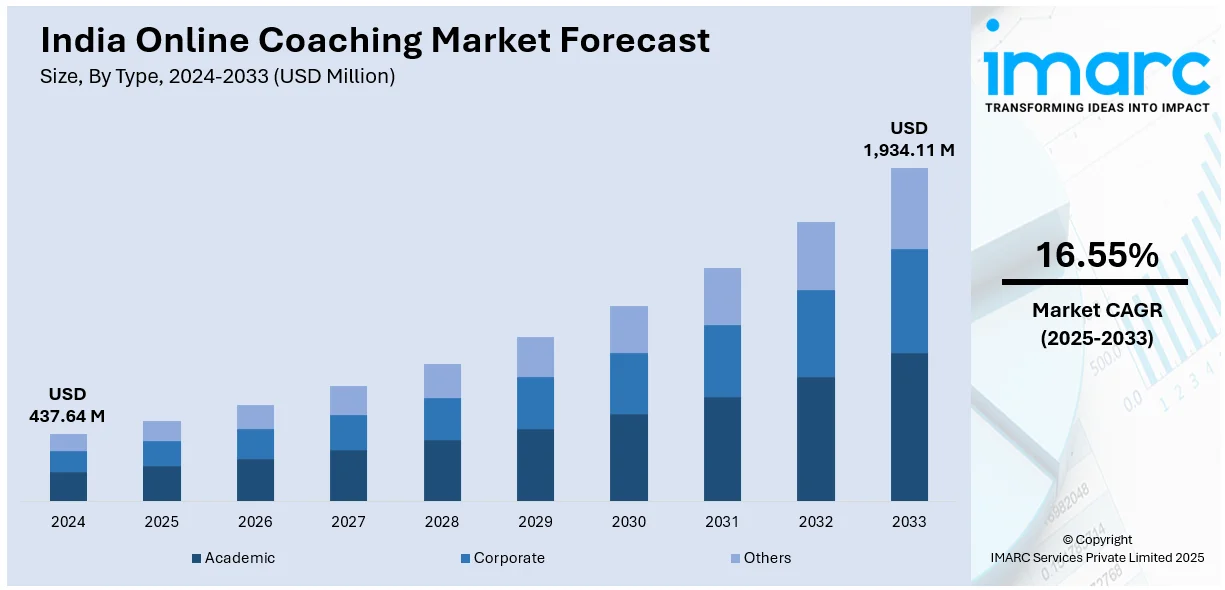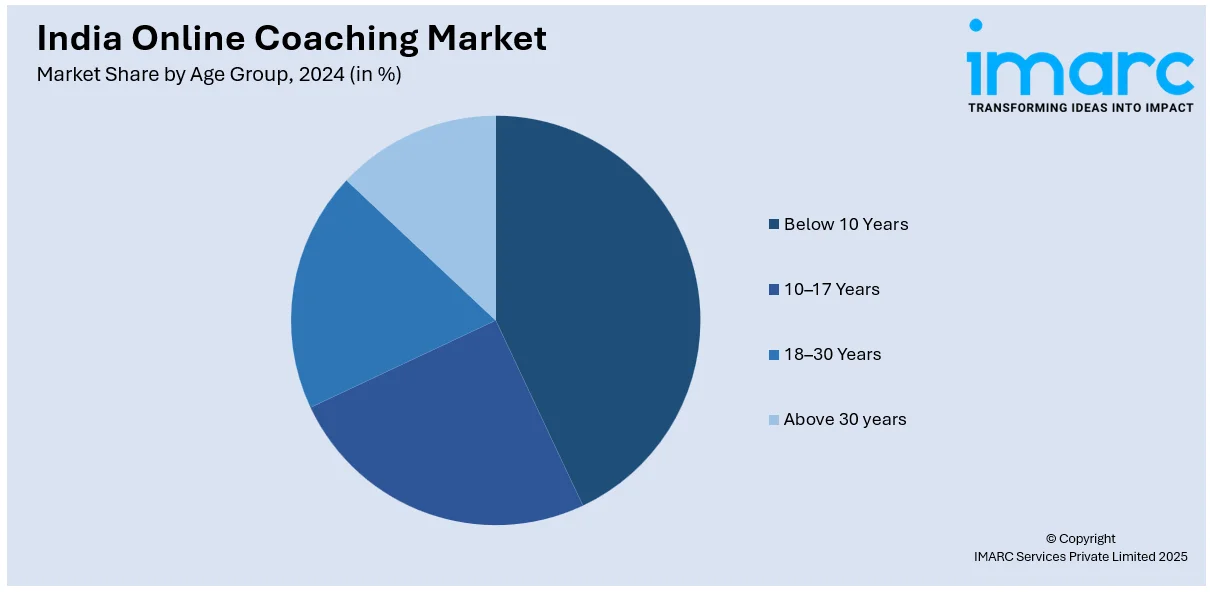
India Online Coaching Market Size, Share, Trends and Forecast by Type, Age Group, Provider, and Region, 2025-2033
India Online Coaching Market Overview:
The India online coaching market size reached USD 437.64 Million in 2024. Looking forward, IMARC Group expects the market to reach USD 1,934.11 Million by 2033, exhibiting a growth rate (CAGR) of 16.55% during 2025-2033. India market is fueled by rising internet penetration, growing smartphone adoption, and demand for low-cost, flexible learning solutions. Growth in artificial intelligence (AI)-based personalized education, government support for digital learning, and popularity of subscription-based models further supporting the market growth.
|
Report Attribute
|
Key Statistics
|
|---|---|
|
Base Year
|
2024
|
|
Forecast Years
|
2025-2033
|
|
Historical Years
|
2019-2024
|
| Market Size in 2024 | USD 437.64 Million |
| Market Forecast in 2033 | USD 1,934.11 |
| Market Growth Rate 2025-2033 | 16.55% |
India Online Coaching Market Trends:
Growth of AI-Driven Personalized Learning
India's e-coaching sector is rapidly embracing AI to enhance personalized learning experiences. AI-driven platforms leverage student performance, learning rate, and strengths in personalizing study timetables to enhance interest and engagement. Research shows that AI-based personalized learning solutions have the potential to enhance academic achievement by 20% to 40%, particularly on mass-market platforms. Students studying for competitive examinations like JEE, NEET, and UPSC benefit from real-time feedback provided by AI-driven chatbots and adaptive learning modules, which give tailored tactics that increase success rates. AI also automates the evaluation and tracking of progress, decreasing the reliance on human intervention. With increasing internet penetration and smartphone usage, AI-based platforms are gaining traction in urban and rural regions, transforming conventional coaching models. This shift is increasing quality education's affordability, scalability, and efficiency in India.

To get more information on this market, Request Sample
Expansion of Hybrid Learning Models
The blending of offline and online coaching is emerging as a major trend in India's education industry. Hybrid models of learning enable students to learn from recorded lectures, live classes, and doubt-clearing forums along with visiting physical coaching centers for face-to-face interactions. This method overcomes the shortcomings of solely digital learning, including the absence of motivation and hands-on guidance. Most established coaching centers are utilizing technology to provide blended courses, integrating the flexibility of online learning with the guided guidance of offline courses. Hybrid models are gaining popularity because they can serve a variety of learning preferences, so coaching centers become more competitive. As digital infrastructure enhances, hybrid learning becomes the preferred method for aspirants looking to prepare for competitive exams.
Rise of Affordable Subscription-Based Platforms
Subscription-based online coaching platforms are quickly gaining popularity in India, offering affordable options to conventional institutions. Monthly and annual schemes offer unlimited access to study material, live classes, and interactive sessions. The trend is driven by increased demand for low-cost test preparation, particularly in Tier 2 and Tier 3 cities. BYJU's, Unacademy, and Vedantu have offered affordable plans that make quality education accessible. In 2024, BYJU'S Exam Prep has introduced flexible subscription plans for its Online Classroom Program, catering to students preparing for competitive exams. This initiative aims to provide affordable, high-quality learning experiences to a wider student base. With increasing demand for online coaching, BYJU'S move strengthens its position in India's edtech sector, ensuring students receive comprehensive exam preparation with expert guidance. Moreover, these models have gamification, quizzes, and peer learning communities included, maximizing engagement. With cost being a major consideration, subscription-based learning is likely to grow even more and revolutionize the coaching sector and put traditional practices under threat in the long term.
India Online Coaching Market Segmentation:
IMARC Group provides an analysis of the key trends in each segment of the market, along with forecasts at the region level for 2025-2033. Our report has categorized the market based on type, age group, and provider.
Type Insights:
- Academic
- Corporate
- Others
The report has provided a detailed breakup and analysis of the market based on the type. This includes academic, corporate, and others.
Age Group Insights:

- Below 10 Years
- 10–17 Years
- 18–30 Years
- Above 30 years
A detailed breakup and analysis of the market based on the age group have also been provided in the report. This includes below 10 years, 10–17 years, 18–30 years, and above 30 years.
Provider Insights:
- Professors/Faculty
- Educational Institution
- Freelancer
- Others
The report has provided a detailed breakup and analysis of the market based on the provider. This includes professors/faculty, educational institution, freelancer, and others.
Regional Insights:
- North India
- South India
- East India
- West India
The report has also provided a comprehensive analysis of all the major regional markets, which include North, South, East, and West India.
Competitive Landscape:
The market research report has also provided a comprehensive analysis of the competitive landscape. Competitive analysis such as market structure, key player positioning, top winning strategies, competitive dashboard, and company evaluation quadrant has been covered in the report. Also, detailed profiles of all major companies have been provided.
India Online Coaching Market News:
- In December 2024, Google partnered with NCERT to launch YouTube channels in 29 Indian languages, including Indian Sign Language, to enhance education accessibility. These channels, aligned with the grades 1 to 12 curriculum, will provide engaging content for students, parents, and teachers. The initiative aims to bring quality education to remote areas, leveraging YouTube’s vast reach to support learning across India through innovative digital resources.
- In November 2024, The Karnataka government launched free online coaching on November 20, 2024, for 25,000 pre-university students from government and aided colleges to prepare for CET, NEET, and JEE. Classes will be held one hour before and after college hours, with students receiving unique login credentials for accessing lessons, tests, and study materials online. This initiative aims to support students in cracking entrance exams for professional courses like engineering and medicine.
India Online Coaching Market Report Coverage:
| Report Features | Details |
|---|---|
| Base Year of the Analysis | 2024 |
| Historical Period | 2019-2024 |
| Forecast Period | 2025-2033 |
| Units | Million USD |
| Scope of the Report |
Exploration of Historical Trends and Market Outlook, Industry Catalysts and Challenges, Segment-Wise Historical and Future Market Assessment:
|
| Types Covered | Academic, Corporate, Others |
| Age Groups Covered | Below 10 Years, 10–17 Years, 18–30 Years, Above 30 years |
| Providers Covered | Professors/Faculty, Educational Institution, Freelancer, Others |
| Regions Covered | North India, South India, East India, West India |
| Customization Scope | 10% Free Customization |
| Post-Sale Analyst Support | 10-12 Weeks |
| Delivery Format | PDF and Excel through Email (We can also provide the editable version of the report in PPT/Word format on special request) |
Key Questions Answered in This Report:
- How has the India online coaching market performed so far and how will it perform in the coming years?
- What is the breakup of the India online coaching market on the basis of type?
- What is the breakup of the India online coaching market on the basis of age group?
- What is the breakup of the India online coaching market on the basis of provider?
- What is the breakup of the India online coaching market on the basis of region?
- What are the various stages in the value chain of the India online coaching market?
- What are the key driving factors and challenges in the India online coaching?
- What is the structure of the India online coaching market and who are the key players?
- What is the degree of competition in the India online coaching market?
Key Benefits for Stakeholders:
- IMARC’s industry report offers a comprehensive quantitative analysis of various market segments, historical and current market trends, market forecasts, and dynamics of the India online coaching market from 2019-2033.
- The research report provides the latest information on the market drivers, challenges, and opportunities in the India online coaching market.
- Porter's five forces analysis assist stakeholders in assessing the impact of new entrants, competitive rivalry, supplier power, buyer power, and the threat of substitution. It helps stakeholders to analyze the level of competition within the India online coaching industry and its attractiveness.
- Competitive landscape allows stakeholders to understand their competitive environment and provides an insight into the current positions of key players in the market.
Need more help?
- Speak to our experienced analysts for insights on the current market scenarios.
- Include additional segments and countries to customize the report as per your requirement.
- Gain an unparalleled competitive advantage in your domain by understanding how to utilize the report and positively impacting your operations and revenue.
- For further assistance, please connect with our analysts.
 Request Customization
Request Customization
 Speak to an Analyst
Speak to an Analyst
 Request Brochure
Request Brochure
 Inquire Before Buying
Inquire Before Buying




.webp)




.webp)












